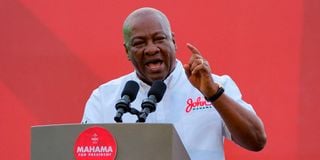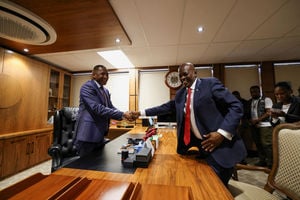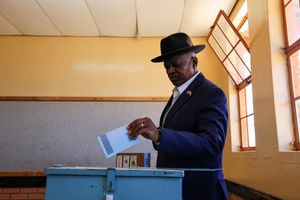
Ghana's former president and National Democratic Congress presidential candidate John Dramani Mahama addresses his supporters during a political campaign in Tamale on July 27, 2024.
More than a dozen candidates have obtained clearance to run for Ghana’s Presidency next month, signaling a congested contest for a post whose winner will have a plate full of problems to solve.
And the economy could be a big issue here after 13 candidates were cleared to run for the December 7, 2024 presidential election.
Ghana is a gold and cocoa producer with 32 million people. But it has been reeling under severe economic hardship.
More than 18 million voters will to go to the polls to elect the next President as Nana Akufo-Addo retires in January 2025 after completing his two terms.
Ghana has been a multi-party democracy since 1992, having lived through a series of coups. It has since gained a reputation for peaceful transfer of power. Yet the economic hardship that it has faced since Covid-19 has become the blot on the outgoing government’s legacy.
Ghanaians will also head to elections to choose 275 parliamentarians.
Four of the presidential contenders are independent candidates. But the race is a bitter contest between the two dominant political parties - National Democratic Congress (NDC) and the New Patriotic Party (NPP) who have won presidencies in the recent past.
Ghana uses a unilateral presidential constitution with a parliamentary multi-party system.
The President of Ghana is elected using the two-round system, whilst the 275 members of Parliament are elected in single-member constituencies using a simple-majority rule.
According Electoral Commission of Ghana, 60-year-old Mahamudu Bawumia of NPP and 65-year-old former President John Dramani Mahama of NDC are the major contenders. Bawumia is the current Vice President.
The Commission said it had also accepted the candidacies of Alan John Kwadwo Kyerematen, a former trade and industry minister who resigned from the ruling party to stand as an independent candidate; Nana Kwame Bediako, a businessman competing for the first time for the top job; and Nana Akosua Frimpomaa, one of two women in the race.
Others are: Daniel Augustus Lartey Jnr of GCPP; Akua Donkor of GFP; Christian Kwabena Andrews, GUM; Mohammed Frimpong of NDP; Hassan Ayariga, APC; George Twum-Barima-Adu (independent) and Alan Kyerematen (independent).
Barely a month to the election, one of the candidates Akua Donkor of Ghana Freedom Party, died and had yet to be replaced by the party, thus delaying the electoral commission from printing the ballot papers for the presidential vote.
The fierce battle will be settled in the turf of economy which has put the fate of the ruling NDP hanging, having been judged by the masses as a failure, Prof Aisha Abu Leko, a political consultant on West African scene said.
Inflation in Ghana has been rising over the last couple of years, reaching 54 percent in 2022, leading to widespread protests, with some calling for Akufo-Addo’s resignation.
Ghana, like Kenya and Nigeria also faced some Gen-Z protests earlier this earlier but were crushed by the police. They were protesting against economic hardships.
Ghana’s skyrocketing debt meant that Ghana had to default and restructure its foreign debt, and went to the International Monetary Fund (IMF) for a $3 billion bailout. Domestic creditors also feeling the pinch.
Like most African countries, ethnic balancing plays its part in Ghana politics. But the electorate will be closely watching how each party plans to address unemployment, inflation, and income inequality and as well as the debilitating hardship.
Youth unemployment remains one of the critical issues, with a large percentage of the population under the age of 30. This demographic is expected to significantly influence the election outcomes as they push for jobs, education, and entrepreneurial opportunities.
Deloitte, an International audit and consulting firm, observed that the upcoming presidential elections will be decided by the welfare of Ghanaians and the state of the economy.
In its West Africa economic outlook for August 2024, the firm noted the sub-region’s economy remains handicapped by high inflation, a high interest rate environment, currency weakness, and elevated debt levels. It is projected that these problems will linger until the end of the year.
“The current state of the economy and citizens’ welfare will factor heavily into how voters evaluate campaign promises and determine the next leader of the nation, an economy heavily dependent on cocoa and gold. The election outcome will weigh on policy direction, as well as investor and market sentiment,” the report read.
“The country’s cocoa output — one of the main drivers of the economy — will encounter volatility as a result of climatic conditions, smuggling, diseases (cacao swollen shoot virus and the black pod, for instance), and global commodity price fluctuations,” the firm’s outlook observed.
The report noted that the, Ghana currency, Cedi’s rapid depreciation against the US dollar has affected the country’s ability to import raw materials and equipment required to boost output.
It forecast, however, that after the election, the Ghana will witness a faster pace of recovery from 2025 onward, driven by an anticipated decline in consumer prices, which will trigger a further cut in interest rates.
Mr Mussa Dankwah, Accra-based researcher for Global InfoAnalytics, reports that the list of qualified candidates was the longest in Ghana's history.
"It just opens up the space but in practice, the votes are going to be among Bawumia and Mahama and most likely, Kyerematen and Bediako. The rest, I don’t expect them to get more than one percent," Dankwah said.
Mahama's NDC party has protest saying the electoral commission had illegally transferred voters to different voting stations without their knowledge.
The electoral commission said it would review a petition submitted by the NDC and provide a response in the coming days. It has previously said identified errors have been corrected.
Meanwhile, President Akufo-Addo has re-assured Ghanaians that the December 2024 elections is going to be free, fair, transparent and peaceful, reiterating his promise to hand over the leadership mantle to whoever will emerge victorious.
The President, thanked Ghanaians for maintaining a peaceful environment over the years, and assured them that his administration will ensure that the upcoming polls does not jeopardise the current peace.
He spoke at the grand durbar of the 2024 Anlo Hogbetsotso Za festival, on November 02, 2024.
“As we all know, without peace, there can be no proper development. The peace we are currently enjoying is the peace we will carry through to the elections on 7th December.


